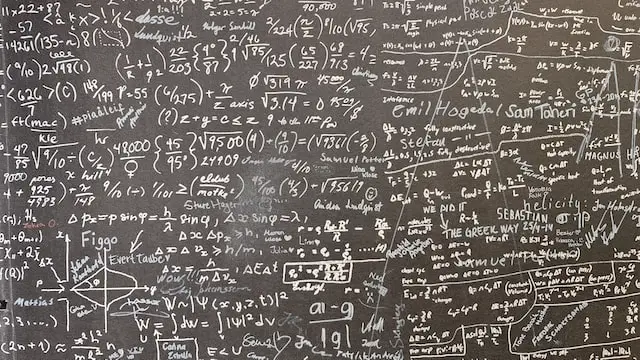Good mathematicians are some of the most highly sought-after professionals in the world. They are required in the field of academics, science, engineering, statistics, finance, and even gaming.
Wherever there is a need for complex problem-solving and number crunching, you will find a demand for mathematicians.
So, how do mathematicians make money?
In this article, we will review 7 different income sources that are available to mathematicians and see how each one works.
How Do Mathematicians Make Money?
While mathematicians can make money in a variety of different ways, not always linked to mathematics, we are going to review 5 ways where they can generate an income using their math skills.
So here are 7 ways in which mathematicians make money:
- Teaching
- Conducting Research
- Programming complex algorithms
- Engineering
- Financial Analysis
- As a Statistician
- As an Economist
Let’s look at each of these more closely.
#1. Teaching
Teaching is the most common way for mathematicians to make money. Many of them choose to become professors at colleges and universities. They typically teach a few classes each semester and also conduct research in their field of expertise.
The rest of the time is spent grading papers and preparing for lectures. Full-time professors usually have summers off, during which they may teach summer school or work on research projects.
Adjunct professors, who are usually not tenured or on a tenure track, typically make less money per course but often teach more courses each semester.
Mathematicians can also make money by teaching at the high school level. They typically have a heavier workload than college professors but often have more flexible hours.
And there are also opportunities to teach math online or in person at a tutoring center.
Overall, teaching is a great way for mathematicians to make money and stay connected to the math community. It also allows them to share their knowledge with the next generation of mathematicians and generate a love for the subject.
#2. Conducting Research
Mathematicians who conduct research usually have very advanced degrees (at least one Ph.D.) in mathematics. They typically work for colleges, universities, or research institutes and are responsible for generating new knowledge in their field.
This usually involves writing papers and giving presentations at conferences. Mathematicians who conduct research also typically teach classes and advise students.
Mathematicians typically receive funding from government agencies or private companies to conduct research in a particular area. Overall, conducting research is a great way for mathematicians to make money and stay connected to the latest advancements in their field.
#3. Programming complex algorithms
Many complex computer programs involve the implementation of mathematical algorithms. Implementing such programs requires skills in coding as well as mathematics.
Software companies will usually assemble teams that include both mathematicians and computer programmers to develop such programs.
But many mathematicians decide to learn to code making them extremely useful to companies that need people with strong math skills and an ability to code or at least to understand code. Coding requires skills like logic and problem-solving, which mathematicians are typically very good at.
Overall, programming complex algorithms is a great way for mathematicians to put into practice the mathematical theories that they have mastery in and see them implemented in the real world and deliver value to those who use the programs.
#4. Engineering
All disciplines of engineering need people with strong math skills. Jobs in engineering typically involve using mathematical models to design products or processes.
For example, civil engineers use mathematical models to design bridges and roads. And mechanical engineers use mathematical models to design engines and other machines.
People with strong math skills are also needed in aerospace engineering, electrical engineering, and chemical engineering.
Overall, engineering is a great way for mathematicians to deploy their skills to solve real-world problems and make money in the process.
#5. Financial Analysis
The financial industry is another great place for mathematicians to work. Financial analysts use mathematical models to assess the risk and potential return of investments.
They also use mathematical models to develop new financial products. For example, the development of the Black-Scholes model for pricing options involved a significant amount of mathematics.
Overall, financial analysis is a great way for mathematicians to use their skills to make money and help people make sound investment decisions. Some of the top banks and financial institutions are the strongest and highest-paying recruiters of newly-baked PhDs in Mathematics from the country’s top universities.
#6. As a Statistician
Statisticians use mathematical and statistical methods to collect, analyze, interpret, and present data. They work in a variety of fields, such as healthcare, marketing, and education.
Statisticians typically have at least a master’s degree in statistics, mathematics, or a related field. They also need to be able to use statistical software programs to analyze data.
Statistics can be a nice off-shoot career for mathematicians. Many times, statisticians work with data that has a mathematical structure to it. Statistics is also needed in fields like machine learning, which is a growing area that relies heavily on mathematics.
#7. As an Economist
Economics and mathematics are inextricably linked. Many economic theories are based on mathematical models. And economists use mathematical models to analyze data and make predictions about economic activity.
Economists typically have at least a master’s degree in economics, mathematics, or a related field. They also need to be able to use statistical software programs to analyze data.
Overall, working as an economist is a great way for mathematicians to use their skills to analyze data and make predictions about the economy. Many top economists have a Ph.D. in mathematics.
Conclusion
So, how do how mathematicians make money? That is the question we have tried to answer in this article.
We reviewed 7 different ways in which mathematicians make money. Teaching and conducting research are two classical ways of generating income for mathematicians.
Some mathematicians take their skills into industry by writing software, doing engineering design or working as statisticians and economists.

